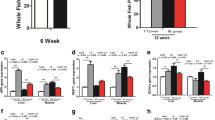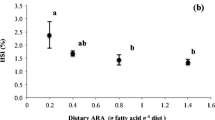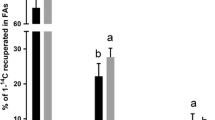Abstract
In intensive farming of Atlantic salmon, a large proportion of observed mortality is related to cardiovascular diseases and circulatory failure, indicating insufficient robustness and inadequate cardiac performance. This paper reports on the use of tetradecylthioacetic acid (TTA) where the main objective was to enhance utilisation of fatty acids (FA), considered the main energy source of the heart. In this study, three experiments were conducted: (I) an in vivo study where salmon post-smolt were administrated dietary TTA in sea, (II) an in vitro study where isolated salmon heart cells were pre-stimulated with increasing doses of TTA and (III) an in vivo experiment where salmon post-smolt were subjected to injections with increasing doses of TTA. In study I, TTA-treated fish had a smaller decrease in heart weight relative to fish bodyweight (CSI) in a period after sea transfer compared to the control. This coincided with lowered condition factor and muscle fat in the TTA-treated fish, which may indicate a higher oxidation of lipids for energy. In study II, the isolated hearts treated with the highest dose of TTA had higher uptake of radiolabelled FA and formation of CO2 and acid-soluble products. In study III, expression of genes regulating peroxisomal FA oxidation, cell growth, elongation and desaturation were upregulated in the heart of TTA injected salmon. In contrast, genes involved in FA transport into the mitochondria were not influenced. In conclusion, these experiments indicate that TTA enhances energy production in salmon hearts by stimulation of FA oxidation.




Similar content being viewed by others
References
Alne H, Thomassen MS, Takle H, Terjesen BF, Grammes F, Oehme M, Refstie S, Sigholt T, Berge RK, Rørvik K-A (2009) Increased survival by feeding tetradecylthioacetic acid during a natural outbreak of heart and skeletal muscle inflammation in S0 Atlantic salmon, Salmo salar L. J Fish Dis 32(11):953–961. https://doi.org/10.1111/j.1365-2761.2009.01078.x
Arge R, Thomassen MS, Berge RK, Zambonino-Infante JL, Terjesen BF, Oehme M, Rørvik K-A (2012) Reduction of early sexual maturation in male S0 Atlantic salmon (Salmo salar L.) by dietary supplementation of tetradecylthioacetic acid (TTA). Aquac Res 45(5):1–12. https://doi.org/10.1111/are.12036
Berge RK, Aarsland A, Kryvi H, Bremer J, Aarsaether N (1989) Alkylthio acetic acids (3-thia fatty acids)—a new group of non-β-oxidizable peroxisome-inducing fatty acid analogues—II. Dose-response studies on hepatic peroxisomal- and mitochondrial changes and long-chain fatty acid metabolizing enzymes in rats. Biochem Pharmacol 28:3969–3979
Berge RK, Skorve J, Tronstad KJ, Berge K, Gudbrandsen OA, Grav H (2002) Metabolic effects of thia fatty acids. Curr Opin Lipidol 13(3):295–304. https://doi.org/10.1097/00041433-200206000-00010
Bremer J (2001) Review: the biochemistry of hypo- and hyperlipidemic fatty acid derivatives: metabolism and metabolic effects. Prog Lipid Res 40(4):231–268. https://doi.org/10.1016/S0163-7827(01)00004-2
Brocklebank J, Raverty S (2002) Sudden mortality caused by cardiac deformities following seining of preharvest farmed Atlantic salmon (Salmo salar) and by cardiomyopathy of postintraperitoneally vaccinated Atlantic salmon parr in British Columbia. Can Vet J 43(2):129–130
Castro V, Grisdale-Helland B, Helland SJ, Kristensen T, Jørgensen SM, Helgerud J, Claireaux G, Farrell AP, Krasnov A, Takle H (2011) Aerobic training stimulates growth and promotes disease resistance in Atlantic salmon (Salmo salar). Comp Biochem Physiol 160(2):278–290. https://doi.org/10.1016/j.cbpa.2011.06.013
Castro V, Grisdale-Helland B, Helland SJ, Torgersen J, Kristensen T, Claireaux G (2013) Cardiac molecular-acclimation mechanisms in response to swimming-induced exercise in Atlantic salmon. PLoS One 8(1):e55056. https://doi.org/10.1371/journal.pone.0055056
Christiansen R, Borrebaek B, Bremer J (1976) The effect of (−)carnitine on the metabolism of palmitate in liver cells isolated from fasted and refed rats. FEBS Lett 62(3):313–317. https://doi.org/10.1016/0014-5793(76)80083-X
Dannevig BH, Berg T (1985) Endocytosis of galactose-terminated glycoproteins by isolated liver cells of the rainbow trout (Salmo gairdneri). Comp Biochem Physiol B Comp Biochem 82(4):683–688. https://doi.org/10.1016/0305-0491(85)90508-5
Dessen J-E, Arge R, Thomassen MS, Rørvik K-A (2016) Differences in fat accumulation between immature male and female Atlantic salmon Salmo salar after dietary administration of tetradecylthioacetic acid. J Fish Biol 89(4):2085–2097. https://doi.org/10.1111/jfb.13113
Folch J, Lees M, Sloane Stanley GH (1957) Simple method for isolation and purification of total lipids from animal tissues. J Biol Chem 226:497–507
Gilde AJ, van der Lee KAJM, Willemsen PHM, Chinetti G, van der Leij FR, van der Vusse GJ, Staels B, van Bilsen M (2003) Peroxisome proliferator-activated receptor (PPAR) α and PPAR β/δ, but not PPARγ, modulate the expression of genes involved in cardiac lipid metabolism. Circ Res 92:518–524. https://doi.org/10.1161/01.RES.0000060700.55247.7C
Grammes F, Rørvik K-A, Takle H (2012a) Tetradecylthioacetic acid modulates cardiac transcription in Atlantic salmon, Salmo salar L., suffering heart and skeletal muscle inflammation. J Fish Dis 35(2):109–117. https://doi.org/10.1111/j.1365-2761.2011.01326.x
Grammes F, Rørvik K-A, Thomassen MS, Berge RK, Takle H (2012b) Genome wide response to dietary tetradecylthioacetic acid supplementation in the heart of Atlantic salmon (Salmo salar L.) BMC Genomics 13(1):180. https://doi.org/10.1186/1471-2164-13-180
Hardie DG (2004) AMP-activated protein kinase: a master switch in glucose and lipid metabolism. Rev Endocr Metab Disord 5(2):119–125. https://doi.org/10.1023/B:REMD.0000021433.63915.bb
Hjeltnes B, Samuelsen OB, Svardal AM (1992) Changes in plasma and liver glutathione levels in Atlantic salmon Salmo salar suffering from infectious salmon anemia (ISA). Dis Aquat Org 14:31–33. https://doi.org/10.3354/dao014031
Hvattum E, Grav HJ, Bremer J (1993) Hormonal and substrate regulation of 3-thia fatty acid metabolism in Morris 7800 C1 hepatoma cells. Biochem J 294(3):917–921. https://doi.org/10.1042/bj2940917
Jäger S, Handschin C, Pierre J, Spiegelman BM (2007) AMP-activated protein kinase (AMPK) action in skeletal muscle via direct phosphorylation of PGC-1 alpha. P Natl Acad Sci USA 104(29):12017–12022. https://doi.org/10.1073/pnas.0705070104
Kleveland EJ, Ruyter B, Vegusdal A, Sundvold H, Berge RK, Gjøen T (2006) Effects of 3-thia fatty acids on expression of some lipid related genes in Atlantic salmon (Salmo salar L.) Comp Biochem Physiol Part B 145:239–248
Kennedy SR, Bickerdike R, Berge RK, Dick JR, Tocher DR (2007) Influence of conjugated linoleic acid (CLA) or tetradecylthioacetic acid (TTA) on growth, lipid composition, fatty acid metabolism and lipid gene expression of rainbow trout (Oncorhynchus mykiss L.) Aquaculture 272(1-4):489–501. https://doi.org/10.1016/j.aquaculture.2007.06.033
Lowry OH, Rosebrough NJ, Farr AL, Randall RJ (1951) Protein measurement with the Folin phenol reagent. J Biol Chem 193(1):265–275
McClelland GB, Dalziel AC, Fragoso NM, Moyes CD (2005) Muscle remodeling in relation to blood supply: implications for seasonal changes in mitochondrial enzymes. J Exp Biol 208(3):515–522. https://doi.org/10.1242/jeb.01423
Moya-Falcon C, Hvattum E, Dyrøy E, Skorve J, Stefansson SO, Thomassen MS, Jakobsen JV, Berge RK, Ruyter B (2004) Effects of 3-thia fatty acids on feed intake, growth, tissue fatty acid composition, β-oxidation and Na+,K+-ATPase activity in Atlantic salmon. Comp Biochem Physiol Part B 139:657–668
Moya-Falcón C, Hvattum E, Tran TN, Thomassen MS, Skorve J, Ruyter B (2006) Phospholipid molecular species, beta-oxidation, desaturation and elongation of fatty acids in Atlantic salmon hepatocytes: effects of temperature and 3-thia fatty acids. Comp Biochem Physiol Part B 145(1):68–80. https://doi.org/10.1016/j.cbpb.2006.06.004
Moyes CD, Mathieu-Costello OA, Brill RW, Hochachka PW (1992) Mitochondrial metabolism of cardiac and skeletal muscles from a fast (Katsuwonus pelamis) and a slow (Cyprinus carpio) fish. Can J Zool 70(6):1246–1253. https://doi.org/10.1139/z92-172
Nurmi A, Vornanen M (2002) Electrophysiological properties of rainbow trout cardiac myocytes in serum-free primary culture. Am J Physiol Regulatory Integrative Comp Physiol 282:1200–1209
Patton S, Zulak IM, Trams EG (1975) Fatty acid metabolism via triglyceride in the salmon heart. J Mol Cell Cardiol 7(11):857–865. https://doi.org/10.1016/0022-2828(75)90136-4
Peterson GL (1977) A simplification of the protein assay method of Lowry et al. which is more generally applicable. Anal Biochem 83(2):346–356. https://doi.org/10.1016/0003-2697(77)90043-4
Polakof S, Panserat S, Craig PM, Martyres DJ, Plagnes-Juan E (2011) The metabolic consequences of hepatic AMP-kinase phosphorylation in rainbow trout. PLoS One 6(5):e20228. https://doi.org/10.1371/journal.pone.0020228
Poppe TT, Johansen R, Gunnes G, Tørud B (2003) Heart morphology in wild and farmed Atlantic salmon Salmo salar and rainbow trout Oncorhynchus mykiss. Dis Aquat Org 57(1-2):103–108. https://doi.org/10.3354/dao057103
Poppe TT, Taksdal T (2000) Ventricular hypoplasia in farmed Atlantic salmon Salmo salar. Dis Aquat Org 42(1):35–40. https://doi.org/10.3354/dao042035
Rørvik K-A, Alne H, Gaarder M, Ruyter B, Måseide NP, Jakobsen JV, Berge RK, Sigholt T, Thomassen MS (2007) Does the capacity for energy utilization affect the survival of post-smolt Atlantic salmon, Salmo salar L., during natural outbreaks of infectious pancreatic necrosis? J Fish Dis 30(7):399–409. https://doi.org/10.1111/j.1365-2761.2007.00823.x
Seglen PO (1976) Preparation of isolated rat liver cells. Methods Cell Biol 13:29–83. https://doi.org/10.1016/S0091-679X(08)61797-5
Skrede S, Sørensen HN, Larsen LN, Steineger HH, Høvik K, Spydevold OS, Horn R, Bremer J (1997) Thia fatty acids, metabolism and metabolic effects. Biochim Biophys Acta 1344(2):115–131. https://doi.org/10.1016/S0005-2760(96)00138-5
Schiller Vestergren A, Trattner S, Mráz J, Ruyter B, Pickova J (2011) Fatty acids and gene expression responses to bioactive compounds in Atlantic salmon (Salmo salar L.) hepatocytes. Neuroendocrinol Lett 32(Suppl. 2):41–50
Schiller Vestergren A, Wagner L, Pickova J, Rosenlund G, Kamal-Eldin A, Trattner S (2012) Sesamin modulates gene expression without corresponding effect on fatty acids in Atlantic salmon (Salmo salar L.) Lipids 47(9):897–911. https://doi.org/10.1007/s11745-012-3697-7
Vinnumálaráðið (1990). Løgtingslóg nr. 9 frá 14. mars 1985 um vernd av dýrum, sum seinast broytt við løgtingslóg nr. 56 frá 19. mai 2015. Available at: www.logir.fo. (Last accessed May 2017)
VKM (2014). Panel on animal health and welfare; risk assessment of amoebic gill disease, VKM Report 2014. Available online: www.vkm.no. Accessed 15 Jan 2018
West TG, Arthur PG, Suarez RK, Doll CJ, Hochachka PW (1993) In vivo utilization of glucose by heart and locomotory muscles of exercising rainbow trout (Oncorhynchus mykiss). J Exp Biol 177:63–79
Zhou M, Xu A, Tam PKH, Lam KSL, Huang B (2012) Upregulation of UCP2 by adiponectin: the involvement of mitochondrial superoxide and hnRNP K. PLoS One 7(2):e32349. https://doi.org/10.1371/journal.pone.0032349
Author information
Authors and Affiliations
Corresponding author
Ethics declarations
Ethical concern
The in vivo study I and the in vitro study were done in Norway and conducted according to the regulations for fish welfare set by the Norwegian Experimental Animal Authority. In the Faroe Islands, however, there is no legislation concerning experiments with animals, so the local “animal protection act” was adhered to throughout the in vivo II study (Vinnumálaráðið 1990). A fish veterinarian advised on best practice in relation to anaesthetization and injection procedures to ensure no undue suffering of the fish. There was no fish mortality caused by experimental procedures or management practice as effort was put into providing optimal welfare of the fish.
Rights and permissions
About this article
Cite this article
Arge, R., Dessen, JE., Østbye, TK. et al. Effects of tetradecylthioacetic acid (TTA) treatment on lipid metabolism in salmon hearts—in vitro and in vivo studies. Fish Physiol Biochem 44, 703–716 (2018). https://doi.org/10.1007/s10695-018-0466-4
Received:
Accepted:
Published:
Issue Date:
DOI: https://doi.org/10.1007/s10695-018-0466-4




